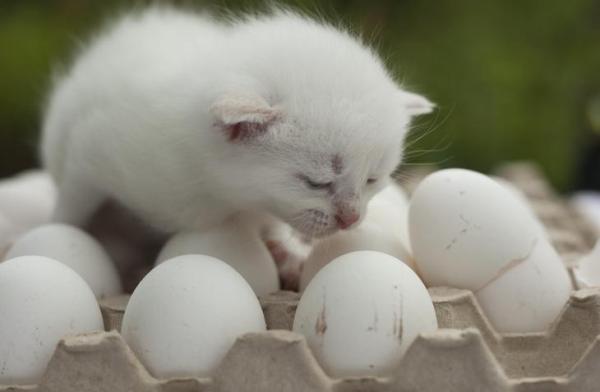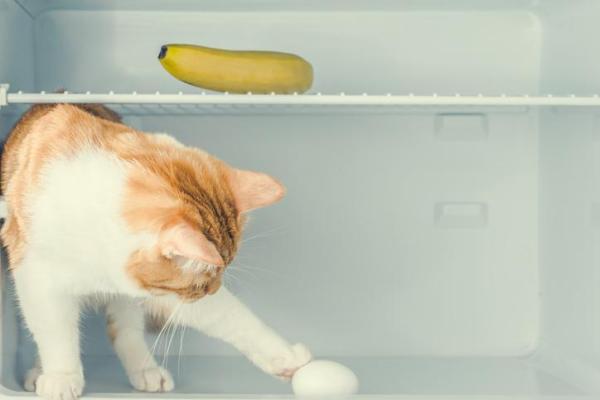Can Cats Eat Raw Eggs? - Harmful Food for Cats



See files for Cats
For many people, chicken eggs are a staple food. They are also one of the most hotly contested foods in terms of nutrition. Public service campaigns have been created in various countries both extolling the virtues of eggs and decrying their potential harm. The main concern appears to be the worry over the egg yolk which is high in cholesterol. However, there are different types of cholesterol. As the majority of fat in the egg is contained within the egg yolk, some argue this can raise your cholesterol. Others suggest that moderate consumption should not have adverse effects.
While the debate continues over the health benefits of eggs, we know that felines and humans don't have the seem nutritional needs. In fact, there are some foods perfectly healthy for humans which are toxic for cats. We also know that cooking changes the chemistry of food, so we might ask not only whether cats eat eggs, but can cats eat raw eggs? AnimalWised investigates to see whether adding eggs to your cat's diet is a good idea.
Nutritional composition of eggs
Before we look into the specifics of whether cats can eat eggs, we want to look at their nutritional composition. By doing this, we can look into the possibility of introducing them into our pet's diet. One of the best resources we can use is the United States Department of Agriculture (USDA) which reports[1] that the nutritional composition of 100 g of raw chicken egg is as follows:
- Energy: 143 kcal
- Water: 76.15 g
- Protein: 12.56 g
- Total fat: 9.51 g
- Carbohydrates: 0.72 g
- Total sugar: 0.53 g
- Total fiber: 0.0 g
- Calcium : 56 mg
- Iron: 1.75 mg
- Magnesium: 12 mg
- Phosphorous: 198 mg
- Potassium: 138 mg
- Sodium: 142 mg
- Zinc: 1.29 mg
- Vitamin A: 140 μg
- Vitamin C: 0.0 mg
- Vitamin B1 (tiamina): 0.04 mg
- Vitamin B2 (riboflavina): 0.45 mg
- Vitamin B3 (niacina o vitamina PP): 0.07 mg
- Vitamin B6: 0.17 mg
- Vitamin B12: 0.89 µg
- Folic acid: 47 µg
- Vitamin D: 82 IU
- Vitamin E: 1.05 mg
- Vitamin K: 0.3 µg
Can cats eat eggs?
If we look at the table laid out above, we can see that the nutritional composition of chicken eggs provides a great source of lean protein. Importantly, there are almost zero carbohydrates (including sugars) and they have a moderate amount of fats. Almost all of the protein supply in the egg is found in the white (also known as the albumen). The lipids/fatty acids are concentrated in the yolk (also known as the vitellus). These two nutrients are the two pillars of a cat's diet. If they don't receive enough of them, they will develop life threatening deficiencies[2]. These nutrients come from animal sources as cats are obligate carnivores and do not process plant based foods efficiently. This is in contrast to we humans who are omnivores.
For this reason, it is important to recognize that egg proteins are mainly formed by essential amino acids. These are amino acids which are not synthesized naturally during feline digestion, leading to the necessity for external sources, i.e. consuming food. As humans are concerned about cholesterol levels of eggs, we should also extend such concern to our animals. However, we should clarify that the cholesterol problem with eggs is linked to amount consumed. Moderate consumption should not lead to raised cholesterol levels or obesity in your cat.
Not only does moderate consumption of chicken eggs not significantly raise feline cholesterol, the benefits of their essential minerals are extensive. These minerals include calcium, phosphorous, iron and potassium. Eggs also contain vitamins A, D and E as well as vitamin B12. Essential nutrients found in eggs contribute to growth and strengthening muscle and bone in our cats. They also help to maintain a healthy immune system to fight off potential disease. Another benefit is that eggs are relatively inexpensive, making them potential supplements for lower income homes with cats.

Can cats eat raw eggs?
The USDA report shows the nutritional value of raw eggs, so it is reasonable to ask if raw and cooked eggs contain the same amount of nutrition. We know that the physical composition of the egg changes, turning from a thick viscous liquid to a solid. Fortunately, for our cats, the nutritional composition alters very little. Proteins and fats are the most important element for a cat's diet and they both exist at essentially the same levels in cooked and raw eggs. The same goes for the vitamins and minerals mentioned in the above section.
However, there is another element which means cooked eggs may be better for cats. There is a protein in raw eggs known as avidin which binds with vitamin B7 (also known as biotin). It is an important elemtn in biomedical research and has potentially far reaching implications[3]. In terms of cats eating raw eggs, the basic principal is that when these nutrients bind, the cat cannot absorb the vitamin.
Unless the cat doesn't receive vitamin B7 from another source, they can be harmful and they may develop a deficiency. Still, most of the other nutrients in the egg would be absorbed. Many people choose to feed their cats a raw food diet. Theoretically it mimics a cat's diet in the wild and provides the essential nutrition they need. However, the science is not as simplistic and there are other considerations you will need to make. To help make these considerations, you can look at this article on raw food diet for cats.
Giving raw eggs to your cat is not good for cats for a simple reason. Raw eggs provide a contamination risk. Mass egg production is such that bacteria such as Salmonella can be present. If your cat eats raw egg contaminated by this or similar bacteria, they can become very ill through food poisoning. Organic, biodynamic and free range eggs may have less chances of being contaminated, but cooking is always advisable.

Should cats eat cooked eggs as a meal?
You can crack a raw egg into your cat's food and they may have no problem enjoying it. It can provide some additional nutrition and your cat may even find it tasty. However, the risk of contamination is not worth it. Cats who get sick from food poisoning can become very ill. A recent report showed that 80% of commercial raw food analyzed contained antibiotic resistant E coli bacteria[4]. When you can minimize this risk through cooking and improve vitamin absorption at the same time, there seems little reason to give your cat raw eggs instead of cooked.
How you cook the eggs is important also. While you might enjoy fried eggs and bacon as part of a meal, this may be too fatty a dish for your cat. The fat content of fried eggs might be OK, but the additional oil you use might not be so healthy. Scrambled eggs might also be fine if you are in a rush, but it is better to cook them in the microwave than in a pan with oil. However, the best way to cook your egg is to simply boil them. Boiled eggs are less hassle for you and your cat will enjoy them just as much without adding any unnecessarily harmful elements.
How much egg can I feed my cat?
We hope the nutritional benefits of eggs have been well argued, but this doesn't mean cats should eat eggs all of the time. Moderate consumption can benefit your cat, but too much will have detrimental consequences on feline health. As with all food, anything in excess will be bad for them.
In general, it is recommended you offer egg to your cats only once or twice a week. You will need to combine it with their usual diet compromised of other foods beneficial to their health. Eggs can even be provided as a relatively helpful rare treat, but too much can be harmful. There is no single ration for cats. Different cats will be of different sizes and states of health. For example, cats suffering obesity may not want to eat eggs, but young cats may find them helpful in their development.
While eggs are a source of animal protein, they should not be used as a replacement for meat in a cat's diet. They need meat to get all of their nutrition, otherwise they will become ill. As cats cannot synthesize certain nutrients, they will need to have them present in their food. Taurine is one of the most important and commercial cat food should have more added as a supplement.
If you are worried about your cat's nutrition and are considering changing or supplementing their diet, you should speak to your veterinarian. They can asses their well-being and also provide check ups to ensure they are not suffering any deficiencies from the change.
Can cats eat non-chicken eggs?
There are other bird eggs commercially available which are not hen eggs (those from a chicken). They include quail eggs, duck eggs and, relatively rare, goose eggs. The nutritional value of these eggs are not dissimilar from chicken eggs. The only problem is the size. Quail eggs are much smaller than chicken eggs, so they can be used well, especially for treats or for smaller cats.
Duck eggs are bigger than chicken eggs and goose eggs are bigger still. This means that, although they have plenty of the vitamins and minerals of chicken eggs, they also contain much more fat and cholesterol. You might want to add some amount of these eggs in their diet, but using a whole one will be too much for any cat (unless it is a one off meal). Another issue is that these eggs are much less common than chicken eggs. Such relative scarcity often makes them prohibitively expensive.
If you want to read similar articles to Can Cats Eat Raw Eggs? - Harmful Food for Cats, we recommend you visit our Homemade diets category.







